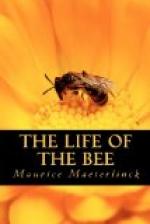yet her eyes and olfactory organs are like the eyes
and organs of the infirm, compared with those of the
male. Were the drones almost blind, had they
only the most rudimentary sense of smell, they scarcely
would suffer. They have nothing to do, no prey
to hunt down; their food is brought to them ready prepared,
and their existence is spent in the obscurity of the
hive, lapping honey from the comb. But they are
the agents of love; and the most enormous, most useless
gifts are flung with both hands into the abyss of
the future. Out of a thousand of them, one only,
once in his life, will have to seek, in the depths
of the azure, the presence of the royal virgin.
Out of a thousand one only will have, for one instant,
to follow in space the female who desires not to escape.
That suffices. The partial power flings open her
treasury, wildly, even deliriously. To every
one of these unlikely lovers, of whom nine hundred
and ninety-nine will be put to death a few days after
the fatal nuptials of the thousandth, she has given
thirteen thousand eyes on each side of their head,
while the worker has only six thousand. According
to Cheshire’s calculations, she has provided
each of their antennae with thirty-seven thousand eight
hundred olfactory cavities, while the worker has only
five thousand in both. There we have an instance
of the almost universal disproportion that exists
between the gifts she rains upon love and her niggardly
doles to labour; between the favours she accords to
what shall, in an ecstasy, create new life, and the
indifference wherewith she regards what will patiently
have to maintain itself by toil. Whoever would
seek faithfully to depict the character of nature,
in accordance with the traits we discover here, would
design an extraordinary figure, very foreign to our
ideal, which nevertheless can only emanate from her.
But too many things are unknown to man for him to
essay such a portrait, wherein all would be deep shadow
save one or two points of flickering light.
[84]
Very few, I imagine, have profaned the secret of the
queen-bee’s wedding, which comes to pass in
the infinite, radiant circles of a beautiful sky.
But we are able to witness the hesitating departure
of the bride-elect and the murderous return of the
bride.
However great her impatience, she will yet choose
her day and her hour, and linger in the shadow of
the portal till a marvellous morning fling open wide
the nuptial spaces in the depths of the great azure
vault. She loves the moment when drops of dew
still moisten the leaves and the flowers, when the
last fragrance of dying dawn still wrestles with burning
day, like a maiden caught in the arms of a heavy warrior;
when through the silence of approaching noon is heard,
once and again, a transparent cry that has lingered
from sunrise.
Then she appears on the threshold—in the
midst of indifferent foragers, if she have left sisters
in the hive; or surrounded by a delirious throng of
workers, should it be impossible to fill her place.




